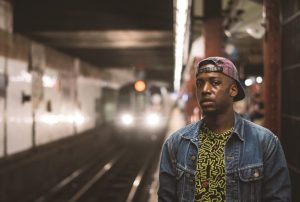What does it mean to be — as the poet, essayist, and playwright Timothy DuWhite puts it — “hard to love”? It’s being seen as “an impossible partner for people,” DuWhite says: being Black and queer, HIV-positive, too hard to handle, or just too insecure.
DuWhite has had friends who have felt this way, as he has himself at times. It’s the feeling that was the impetus behind his play Neptune, a one-man show that he’ll perform at the Provincetown Theater next Thursday, June 17 through Saturday, June 19. It’s the first in-person presentation at the theater, in its new outdoor Playhouse in the Parking Lot, since the pandemic shut it down more than a year ago.

“Neptune started as a poem — that was my original thought,” says DuWhite, speaking by phone from Brooklyn, N.Y., where he’s based. “I got approached by this theater called Dixon Place. They said, ‘We really love your work.’ I got a residency there to create a full-length show. Over the months, I just started building it, piece by piece. I would share it with an audience, and I got a lot of feedback.”
DuWhite has said that it was a revelation to him that his father — who was in the military and present though emotionally distant when he was growing up — was from Neptune, N.J. The town’s relation by name to the distant planet in our solar system is a welcome metaphor.
“The idea of Neptune is that it’s a place of refuge for people who are hard to love,” he says. “Any kind of place. It’s a space where you do not feel the stress of having to perform. Feeling safe and comfortable without having to negotiate different things about who you are.”
Much of the discomfort DuWhite feels and recognizes in others comes from systemic racism, which he sees as a form of state violence. “The show dials it back to the root of where our insecurities come from,” he says. “ ‘My skin is too dark.’ Whatever kind of beauty standards we could talk about. ‘I feel unsafe because I lived in a particular neighborhood.’
“The big topic — the most wildly understood form of state violence — is police violence,” DuWhite continues. “Health disparities are also a sign. What are the causes of disease in Black communities? Police brutality and the AIDS epidemic are the same thing. Homelessness, joblessness, food insecurity. It’s insidious.”

Though his work is “semi-autobiographical,” DuWhite aims for art as much as activism. Growing up queer in a “family that isn’t queer” is a common source of LGBTQ alienation, and the personal is political for him. DuWhite is staunchly existentialist, insisting on the right to define what his identity means. And his story is compelling and unique: he was a track-and-field athlete as a teenager, and discovered he was HIV-positive at age 21, a result of his first serious relationship. He scoffs at the presumption that those who seroconvert are promiscuous. He has been married for the last four years.
Asked about how he dealt with the church when he was growing up, he responds, “It’s interesting. I didn’t have the super-known story. I did grow up going to church, but as a teenager, I was doing my own thing. I have a fraught relationship with the church — spiritualism is still important to me — and the reverberations still affect me. My neighbor might be a Bible-thumper.”
A poem he has performed about renewing dating and sex a year and a half after his positive diagnosis, and his choosing to forgive the ex who infected him, is full of rage and wisdom. The source of his ire is a boyfriend who’s on PrEP and unilaterally decides not to use a condom. “Just because they feel comfortable and interested, they are given the reins to administer how this interaction goes,” he says. “And they are seen as the brave, noble party. That is maddening. It strips positive people of agency. ‘No, I don’t care that you are so brave. I still want to use a condom.’
“This partner feels powerful because he’s dating someone who can be seen as undesirable,” DuWhite continues. “It’s the same as what people in a wheelchair might experience.”
He says that, when he’s writing, “I create my work for Black people,” and that he’s never been to Provincetown before. “I’m just going to do my thing,” he says. It’s his first live performance since the pandemic. That alone should strike some familiar chords. “Covid furthers the conversation on AIDS,” he says. “More people understand what this actually means.”
A Safe Place
The event: Timothy DuWhite performs his one-man play Neptune
The time: Thursday, June 17 through Saturday, June 19 at 7 p.m.
The place: Provincetown Theater’s Playhouse in the Parking Lot, 238 Bradford St.
The cost: Check for availability of premium and general seating at provincetowntheater.org; box office hours are Monday through Thursday, 1 to 6 p.m. (508-487-7487)



